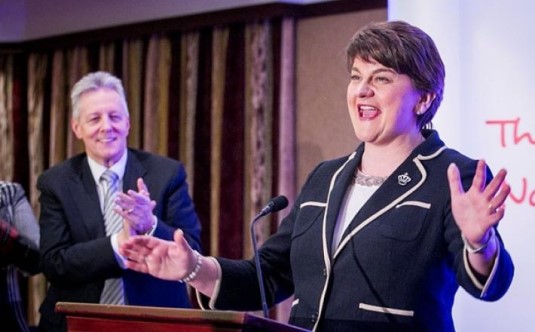
I'd put the house on the latter. According to the News Letter, not one but four round robin letters were in circulation calling for Foster's head. The contents make interesting reading. She's carrying the can for Westminster's imposition of abortion law on the North, a policy one letter changing hands between the DUP's councillors says must be "overthrown". Sorry guys, if you want to remain part of the United Kingdom then there are no special opt outs. There's the hullabaloo over the border in the Irish Sea, which Boris Johnson created, denied it existed, and still affects to only half-believe its presence. And somehow Foster is responsible for Sinn Fein ministers turning up at an IRA funeral last year, the ostensible catalyst for recent loyalist riots. As boss and First Minister of the six county statelet, Foster is formally responsible. But substantively? She's more a pawn of larger forces than the author of hers - and unionism's - destiny.
It was funny then to read Robert Peston's shot-from-the-hip as he speculated about the DUP after Foster. It could continue its path toward the centre of Northern Ireland's politics(!), or lurch to the right and spurn voters who might turn to Sinn Fein(!!). It's embarrassing. But perhaps the real reason for Foster's jaunty farewell was relief. The DUP are hemmed in by intractable problems. For some DUP players, they know the party's standing is menaced from the right - particularly the aggro-loyalist Traditional Unionist Voice - who've started chomping into their starboard flank. Having seen how Brexit ultraism did the business for the Tories, dumping Foster and taking a hard position on abortion, gay rights, and the Irish Sea border is, they think, the way to restore the party as the uncontested hegemon of official loyalism.
Peston might have showed his weak grasp of politics in the province, but his instinct is correct. With the DUP poised to heed the siren calls of Orange Order certitude, they are bleeding votes not to Sinn Fein but the centrist Alliance. Having emerged from within the loyalist community at the height of the Troubles, they spoke for the layer fed up with the overt sectarianism of the old Ulster Unionist Party and wanted to avoid the descent into civil war. More recently, it has successfully established itself as a break with the past, supporting remain during the referendum and providing an alternative to the unionist parties that doesn't go the whole hog into outright republicanism. If that wasn't bad enough, the Alliance's voters tend to be older and therefore more likely to turn out. It's not beyond the realms of possibility that come the 2022 elections, they and Sinn Fein could emerge as the largest parties and the so-called mainstream of loyalism is left out in the political cold by voters. The sectarian statelet without the sectarian forces having a say on the Executive, a bizarre eventuality just a few years ago is now a real possibility.
Whoever takes over from Foster has an incredibly difficult job to do. Writing snarky letters and talking the big man down the lodge is one thing, but facing up to the crisis of unionism is quite another. The Irish Sea border's not going anywhere, the party is pressured by electoral dangers to its left and right, and the political and cultural continuity of loyalism is visibly rotting. Unfortunately, as is usually the case when long-established movements are in decline, they tend to cling onto the fundamentals regardless of the wider damage this causes. With unionist mobs on the streets, historically high levels of support for a united Ireland, and an electoral eclipse just over the horizon, the consequences of the DUP's weakness are not going to be pretty.
Image Credit
2 comments:
Update: she's not only ditching her seat, but leaving the DUP too.
If the more conservative wing of Loyalism has no political influence, then what incentive does it have not to return to violence?
I sincerely hope that it is as infiltrated by the security services as I think it is.
Post a Comment